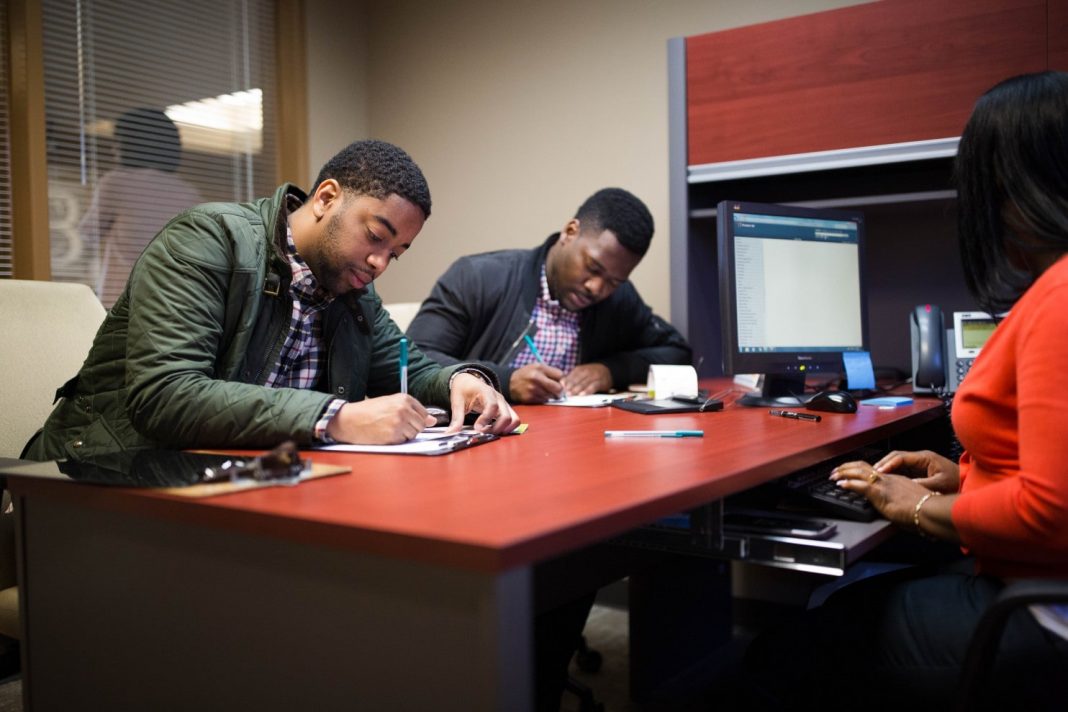Noah Wills and Jonathan Davis fill out applications to open checking accounts during the Black Transfer Challenge at Citizens Trust Bank in Atlanta. (Kevin D. Liles for the Washington Post)
OneUnited Bank is known as the largest Black owned bank in the country and it’s using that platform to provide assistance to Black entrepreneurs during the COVID-19 crisis. The bank recently announced the launch of its Small Business Administration (SBA) Paycheck Protection Program (PPP). The bank is offering PPP loans to new and existing customers across the country, through its online and mobile banking platform. As part of the second round of PPP, $30 billion in stimulus funds has been allocated to Minority Depository Institutions (MDIs) and Community Development Financial Institutions (CDFIs); OneUnited Bank is making sure Black businesses get their share, but they’re not alone.
The Paycheck Protection Program is a feature of the Coronavirus Aid, Relief, and Economic Security Act (CARES Act). The program provides small business loans to support payroll and other expenses: the loans are forgivable. For Black owned businesses, the loans were seen as a beacon of hope; the COVID-19 pandemic represents a viable threat to the very existence of Black owned businesses. Even so, during the initial rollout of the program, a high number of Black owned businesses weren’t able to secure loans, as the funding quickly ran out. That doesn’t mean, however, that Black owned banks weren’t doing their part. Black financial institutions like Industrial Bank in Washington, Citizen’s Trust Bank in Atlanta, Unity National Bank in Houston and others, have been active in the program. For all of the failures of PPP, things would have been worse for Black entrepreneurs, without Black owned banks stepping up to do what they could to help.
Bank of America and Wells Fargo has not and will not ever prioritize getting capital to Black entrepreneurs. That was true before COVID-19 and it certainly will be true once this pandemic subsides. “Most of our customers who filed PPP applications with other institutions during the first round were not funded,” said Teri Williams, president and COO of OneUnited Bank. “We’re proud that OneUnited can step up to provide Black businesses with better access to stimulus funding.”It is only reasonable, then, to ask why Black consumers aren’t equally committed to Black owned banks. The discussions around supporting Black owned businesses are gaining traction nationally but those discussions ignore that Black owned banks are needed to support those businesses and provide capital to Black communities, who sorely need it. The gross failure of PPP to reach Black entrepreneurs, contrasted with the efforts of Black owned banks to directly target them, is but a dramatic case study in what happens each and every day.
If Black dollars and Black businesses matter, surely Black banks must, also. The rollout of PPP grabbed headlines and helped to illustrate, in a dramatic way, how Black entrepreneurs are systematically locked out. It is the everyday bias and institutional racism, however, that harms Black entrepreneurs most. In order to fight it, a devout commitment to Black institutions is necessary and that most certainly includes Black owned banks.








